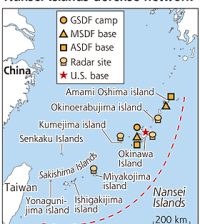- Washington “follows with interest” Morocco’s openness onto Africa (John Kerry)Posted 12 years ago
- The trial of South African Paralympic champion Oscar Pistorius opened in Pretoria on Monday.Posted 12 years ago
- USA welcomes efforts of King Mohammed VI in MaliPosted 12 years ago
- Egypt’s population reaches 94 millionPosted 12 years ago
- Mugabe celebrates his 90thPosted 12 years ago
- Moroccan Monarch to Build a Perinatal Clinic in BamakoPosted 12 years ago
- King Mohammed VI handed a donation of bovine semen for the benefit of Malian breeders.Posted 12 years ago
- Moroccan King’s strategic tour to Africa: Strengthening the will of pan African Solidarity and stimulating the south-south cooperation mechanisms over the continentPosted 13 years ago
- Senior al-Qaida leader killed in AlgeriaPosted 13 years ago
- Libya: The trial of former Prime Minister al-Baghdadi AliPosted 13 years ago
Japan’s Next PM Battle: The Race to Succeed Ishiba
Tokyo. ELM R: With Prime Minister Shigeru Ishiba compelled to step down, attention now turns to who will lead the Liberal Democratic Party (LDP)—and by extension, Japan. Among the contenders are those eager to seize the post, others who aspire but hesitate, and still others with little visible ambition who may nonetheless be called upon to fill the void.
Two prominent candidates are Agriculture Minister Shinjirō Koizumi, son of former Prime Minister Junichirō Koizumi, and Sanae Takaichi, a former economic security minister who could become Japan’s first female premier. Both were strong contenders in the 2024 LDP presidential race but ultimately lost to Ishiba. Whoever succeeds him will inherit the burden of leading a minority government, requiring constant negotiation with opposition parties.
Ishiba’s resignation followed the LDP’s loss of its coalition majority in the July Upper House elections. In his final press conference, he urged his successor to address U.S. tariffs, establish a disaster management agency, and deliver wage growth. Candidates for the party presidency need the backing of at least 20 LDP lawmakers. Beyond Koizumi and Takaichi, potential challengers include Takayuki Kobayashi, a former economic security minister; Chief Cabinet Secretary Yoshimasa Hayashi; and Toshimitsu Motegi, a veteran former foreign and economy minister. All previously contested the 2024 race.
Opinion polling highlights Takaichi’s appeal. In a Nikkei survey last month she led with 23 percent support, closely followed by Koizumi at 22 percent. Takaichi has long drawn backing from conservatives, once enjoying the patronage of former Prime Minister Shinzo Abe and later that of LDP heavyweight Taro Aso. In 2024 she topped the first round of voting but lost to Ishiba in the runoff. Her refusal to join Ishiba’s cabinet afterward signaled a deliberate choice to preserve her independence.
Koizumi, meanwhile, remains a paradox. Popular with the public and symbolizing generational change, he nonetheless faces skepticism within the LDP, where seniority and bureaucratic command remain decisive. His current test lies in agriculture: rising rice prices have forced him to act decisively. Success would bolster his credibility as a policymaker; failure would reinforce the narrative of inexperience. His broader agenda seeks to balance progressive instincts with pragmatic reassurances on energy, fiscal policy, and central bank independence.
Hayashi, who placed fourth in the last race, previously served as Chief Cabinet Secretary—a position that has often served as a springboard to the premiership. Figures such as Ichirō Hatoyama, Yasuo Fukuda, Shinzō Abe, and Yoshihide Suga all rose from this office, demonstrating its role as both incubator and stabilizer in times of crisis. In this tradition, Hayashi represents continuity and credibility. Kobayashi, though younger and less established, retains some backing among backbenchers, while Motegi, the oldest contender at 69, embodies long experience but limited momentum, having placed only sixth in 2024.
The mechanics of the LDP election matter. Each lawmaker casts one vote, balanced by an equal number of votes from local party members. In 2024, Takaichi secured 72 lawmaker votes and 109 from party members, while Koizumi received 75 and 61. Yet victory in the party contest does not guarantee the premiership: a united opposition could block the LDP nominee in parliament. Effective governance will also demand cooperation with the Constitutional Democratic Party, the Japan Innovation Party, or the Democratic Party for the People. The immediate task for the new leader will be to secure agreement on the fiscal 2025 supplementary budget, the fiscal 2026 budget, and tax reforms.
Ultimately, the next prime minister will be forced into constant negotiation, leading a government under pressure from a rapidly strengthening opposition. This challenge is compounded by a tense regional and global environment, with 2026 expected to be a year of profound difficulties across Europe, the United States, Asia, and Africa, while the Middle East faces critical decisions with global repercussions. In such a setting, the LDP’s choice will not only determine its own future but may also reshape Japan’s role in an unsettled international order




